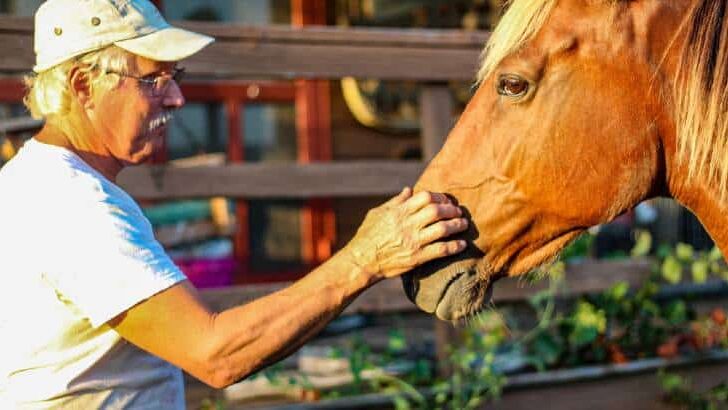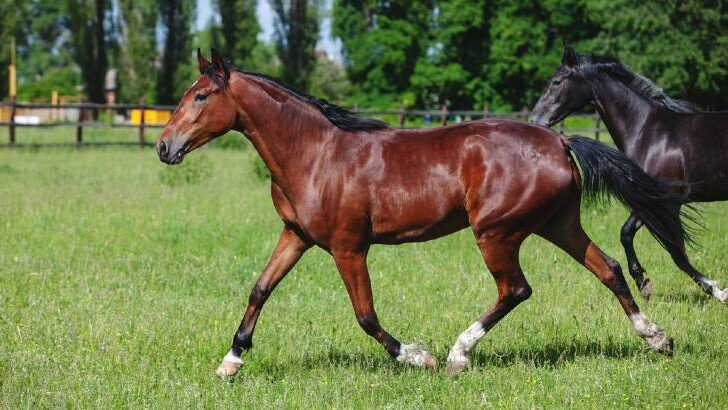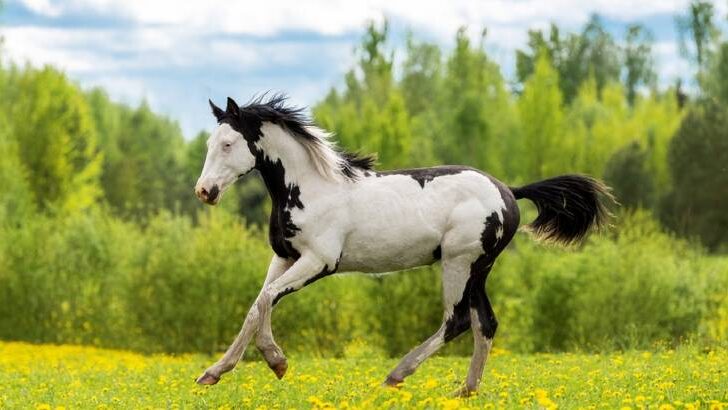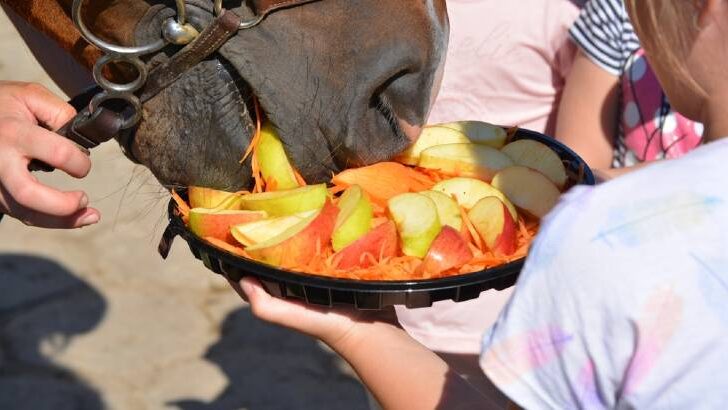Affiliate Disclaimer
As an Amazon Associate I earn from qualifying purchases. It helps me keep the website going. Thank you for your support.
Some people are lucky enough to learn how to ride horses when they are children. But this isn’t true for everyone. Circumstances or finances might have meant that you were unable to learn to ride when you were younger. Now that you’re a bit older, you might be wondering am I too old to learn how to ride a horse?
The good news is, you are never too old to learn how to ride a horse. Horse riding involves some physical fitness, flexibility, coordination, and strength. But most of all, it requires that you are patient with yourself and the horse.
This article will outline some of the skills you need to learn how to ride a horse. You can work on and improve these skills at any age. This means that you can learn to ride a horse no matter how old you are.
That being said, I am a horse rider and not a medic. I can’t offer medical opinions. If you have any concerns about your physical health and whether horse riding is right for you, it’s advisable to consult with a doctor first.
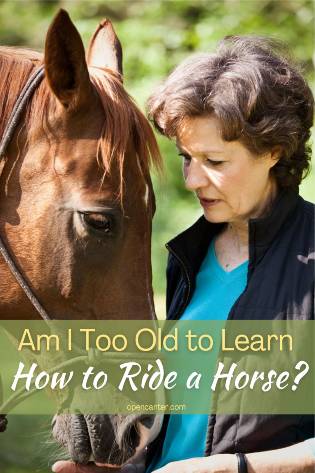
Am I Too Old to Learn to Ride Horses?
Let’s take a look at some of these factors so that you can decide whether it’s time to finally get in the saddle.
What Skills does Horse Riding Require?
There is a bit of a misconception amongst non-riders that horseback riding is an easy sport. In fact, some people wonder whether it’s even a sport at all.
However, anyone who has ever done any riding will know that it does require a number of important skills. Here are some of those all-important skills…
Physical Fitness
Horse riding requires a good level of physical fitness. You don’t need to be really fit to begin horse riding. So, if you’re not especially fit, don’t let that put you off.
However, as you progress in your horse riding journey, you will find that your fitness level will improve. And as you get fitter in the saddle, you will be able to do more challenging riding activities.
Once you have been riding for a while, you may start to take for granted how physically fit you have become.
I was recently reminded of what a good workout horse riding can be when I broke my wrist. The break didn’t happen in a horse-related accident. I simply fell when I was at home and landed awkwardly on my hand.
Nevertheless, the fall did break my wrist, and my arm was in a cast for some weeks. As a result, I was unable to ride for about 3 ½ months. You can read more about riding after breaking a wrist here.
When I did finally get a chance to ride again, I was shocked by how out of breath I was after cantering around the school for five minutes. It really brought home to me exactly how fit you become when you’re riding regularly.
So, if you’re wondering whether you’re too old to learn how to ride a horse, consider your general fitness levels. It’s a bonus if you are reasonably fit when you start to learn. However, you don’t need to have athletic levels of fitness when you begin.
Flexibility
Riding a horse does require a level of flexibility to ride comfortably and well. If you think about it when your horse riding you sitting in a position that requires some flexibility, particularly in your hips.
And it’s not just your hips that need to be flexible. You also need some flexibility in your legs, knees, ankles, and back.
Also, there are a few things that you need to do when you are horse riding. It sounds obvious, you need to be able to get on and off the horse without too much trouble. This is called mounting and dismounting.
Whilst it can seem a long way up to get onto a horse, you needn’t worry if you are not that flexible in the beginning. Most riding schools will ask you to get on your horse off the mountain block rather than directly from the ground. This is better for the horse’s back, and your legs too!
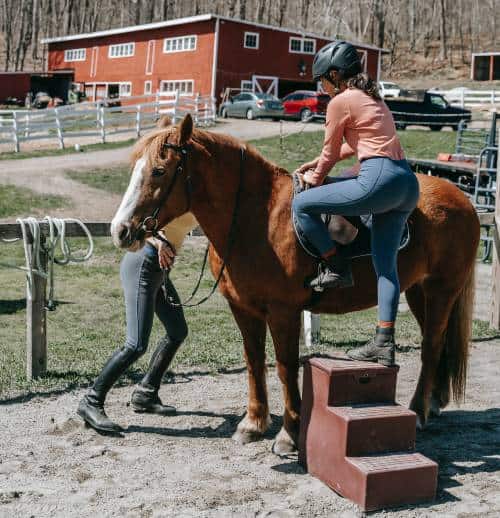
And you need to be able to sit in the riding posture for a period of time. Most riding lessons are between 30 and 60 minutes long.
However, as with physical fitness, if you’re not especially flexible to start off with this doesn’t need to be an issue in the long run.
As you learn to ride, your instructors will advise you about what parts of your body need to become more flexible. And they will recommend exercises that will help your range of movement.
Flexibility is always a work in progress for all horse riders regardless of how long they’ve been riding or how old they are.
Coordination and Motor Skills
One of the other misconceptions about horse riding is that the horse is doing all the work, and the rider is just sitting there.
Actually, when you’re riding you have to coordinate your legs and arms to give the horse a series of indicators about what you want them to do. These are called riding “aids”.
In fact, it’s not really just your legs and arms that you have to coordinate. You also have to use your seat and pretty much every part of your body in a balanced way.
Horses are often sensitive and can pick up small movements and shifts in your body. So, in time, you need to learn how to organize your body in a way that’s going to help the horse know what you want.
This also takes time. And in the beginning, it can often feel like you’re being asked to do an impossible combination of things all at once. However, your age really isn’t a factor that will affect your ability to master the skills.
It may be true that children pick up new motor skills more quickly than adults. This is partly because when you’re a child your brain and body are developing so much, acquiring new skills it’s just part of day-to-day life.
However, with practice and persistence, it’s absolutely possible to learn how to ride a horse regardless of how old you are. That brings me on to the next important skill involved in riding…
Patience
The other superpower that good horse riders have is the gift of being patient with themselves and their horse. Riding is like any other sport or skill that involves coordination, motor skills, and dexterity.
You never really stop learning, and there will be times that feel very frustrating when it feels like you’re never going to “get” it.
However, at these times of frustration, it can be helpful to remember that most things that are worth having are not easy to achieve. You wouldn’t expect yourself to just be able to pick up a violin and play it without months and years of practice. And the same goes for horse riding.
However, this doesn’t mean that if you’re older there is no point in starting. Regardless of how old you are when you start to learn how to ride a horse, we all begin at the same point, not knowing what we’re doing. Just remember to cut yourself some slack if you find it’s taking time for the penny to drop.
Muscle Strength
Depending on your age, you might find you don’t have quite the same amount of muscle strength as you did when you were younger. Horse riding does require some degree of physical strength.
However, there are other skills that are more important than being strong. I’m definitely less strong than I was when I was in my 20s. But I have found that flexibility and coordination are much more important when it comes to horse riding when you’re older.
You do need some strength in your legs, arms, core, and back in order to horse ride. However, riding well it’s definitely not a matter of brute force. In fact, if you can communicate with your horse, without using too much muscle and strength then you are doing well.
There’s a lovely book by Elaine Heney, called The Equine Listenology Guide. This is all about gentle horse riding, and tuning into a horse rather than using brute force to achieve what you want to achieve in the saddle.
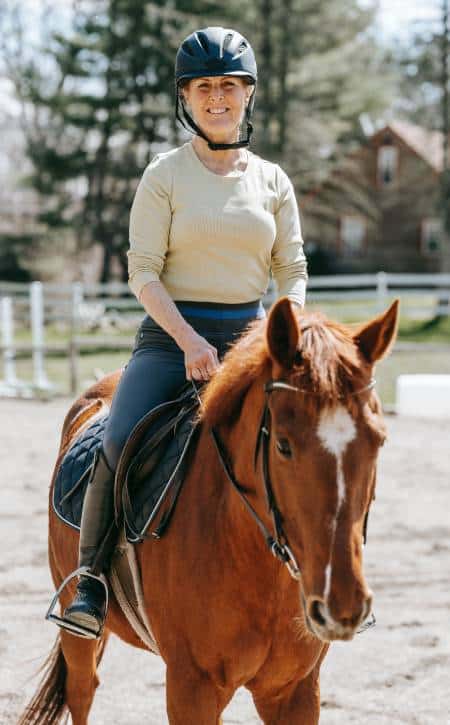
How Long Does It Take to Learn to Ride a Horse?
The amount of time it takes to learn how to ride a horse isn’t affected by how old you are. Here are some factors that are important…
- How often you are able to ride? The more often you are able to ride, the quicker it will be that you can master some of the skills outlined above.
- Do you have access to well-schooled horses? Riding school horses vary considerably in age, temperament, and ability. If you ride a willing and well-schooled horse, this can help a lot.
Some horses have the ability to make you look really great! Having said that, riding horses that are more of a challenge can be a useful experience. In fact, riding a wide range of different types of horses can be a good idea. As different horses feel very different from one another to ride. - Is your riding instructor patient and experienced? Having a riding instructor who is interested in you and wants to bring out the best in you and your horse makes a big difference.
If you’re being taught in a riding school you often don’t have much choice about who is teaching you. But it’s worth seeing if you can have a lesson with different instructors to see if you can find a good fit for you.
Progress can often seem slow. And you will probably reach plateaus when you feel like you’re not improving for periods of time. When you reach those plateaus, just try to push through and keep going.
Practical Considerations
Regardless of how old you are when you learn how to ride a horse, it’s a good idea to find a riding school that you feel comfortable at. Horse riding is a popular pastime for younger people.
At the weekend many riding schools have an overwhelming number of young people milling about and congregating. That makes me sound really old! But the truth is, when you’re learning how to ride as an adult, it can feel a bit overwhelming and intimidating to be surrounded by rowdy and excited young equestrians.
It may be worth seeing if you can arrange to have a riding lesson during the week when the riding school is a little quieter. Also, at the weekend group riding lessons are often made up mainly of children.
You may be completely okay with this. But if you’d rather not be bouncing around in the saddle, with a posse of eight year old’s, a weekday lesson may suit you better.
Just remember, when you’re finding a riding school that suits you, it’s okay to shop around. Take lessons in a few places and see which one feels like a good fit for you.
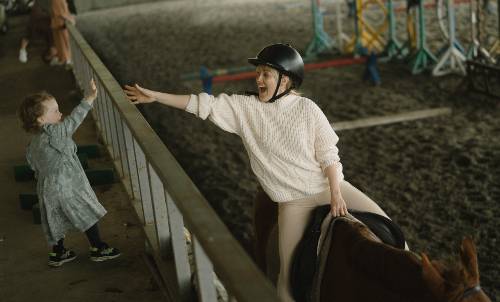
Getting Some Riding Gear
You may be able to borrow a pair of boots and a riding hat at your local riding school. This is fine in the short run, but my experience of borrowing riding gear is that it is often quite dusty, dirty, and a bit smelly.
One thing to know about riding is that you do get a bit sweaty when you ride. Quite often when you remove your riding helmet, it will be wet with sweat on the inside. It’s worth remembering that when you’re borrowing a riding hat at a riding school.
If you know you want to learn how to ride a horse, and don’t want to borrow smelly old riding gear from the stables you can invest in your own kit.
The riding school will most likely advise you about what to wear for your first lessons.
What they suggest, will depend on whether you are learning to ride Western or English style.
If you’re learning to write English style, then you will need a helmet that looks something like this…
Also, regardless of whether you’re riding English or Western style, you will need a pair of boots with something of a heel on them. This is to stop your foot from slipping about in the stirrup.
Expect a Few Aches and Pains
Horse riding is quite a high-impact activity. When you’ve been riding for a while, you will develop what’s called a ‘good seat’. This means that you sit deeply in the saddle and don’t bounce around too much as your horse moves.
But certainly, in the early days, you will probably be quite bouncy and a bit unsteady in the saddle.
In addition to bouncing, you will be asking your body, and in particular your legs to hold positions that they’re not used to. Even for younger people and children, horse riding is challenging for muscles and joints. This is particularly true when you are just starting to ride.
So, it’s normal to experience some aches and pains when you first start riding. These aches and pains may be more bothersome depending on your age and general fitness level.
Knees are a particular point of vulnerability for many horse riders. You can learn more about what to do about knee pain when horse riding here.
If you are worried about whether you are physically up to horseback riding, you can always consult a physician beforehand to get a professional opinion.
Final Thoughts
Regardless of how old you are, it’s never too late to learn how to ride a horse. Your age and general fitness level may have an impact on how long it takes you to learn. And, depending on these factors your riding instructor will most likely adapt their teaching approach to suit your needs. Either way, learning how to ride at any point in your life can be an immense source of joy. If you’re going to ride off into the future, you may as well do it on a horse.

